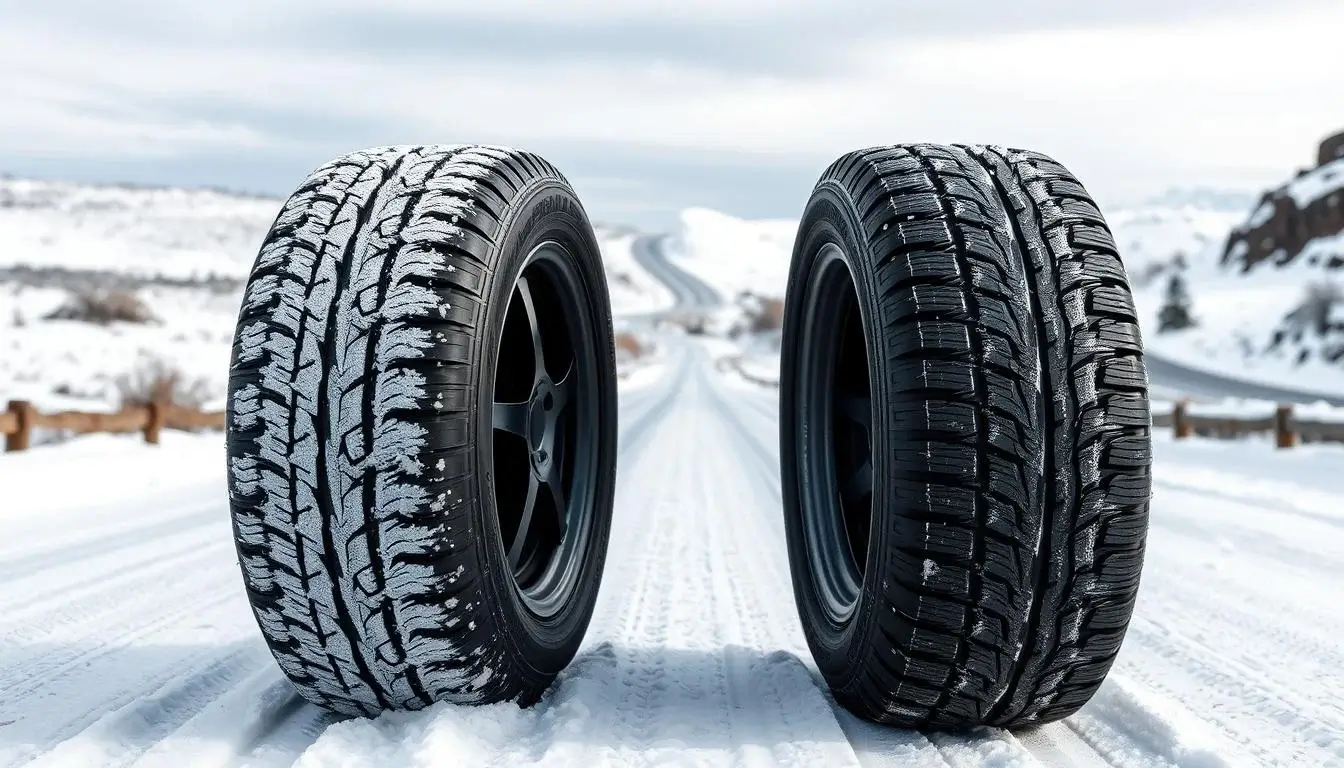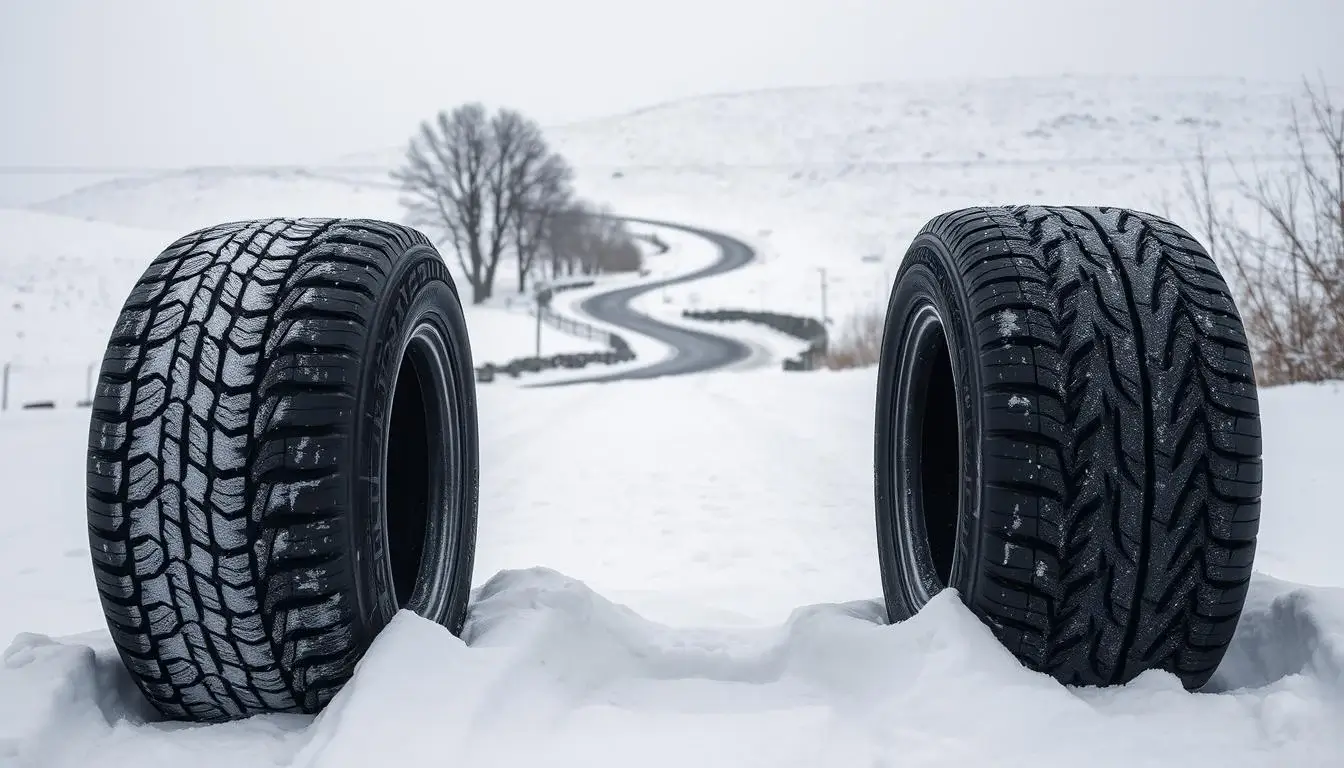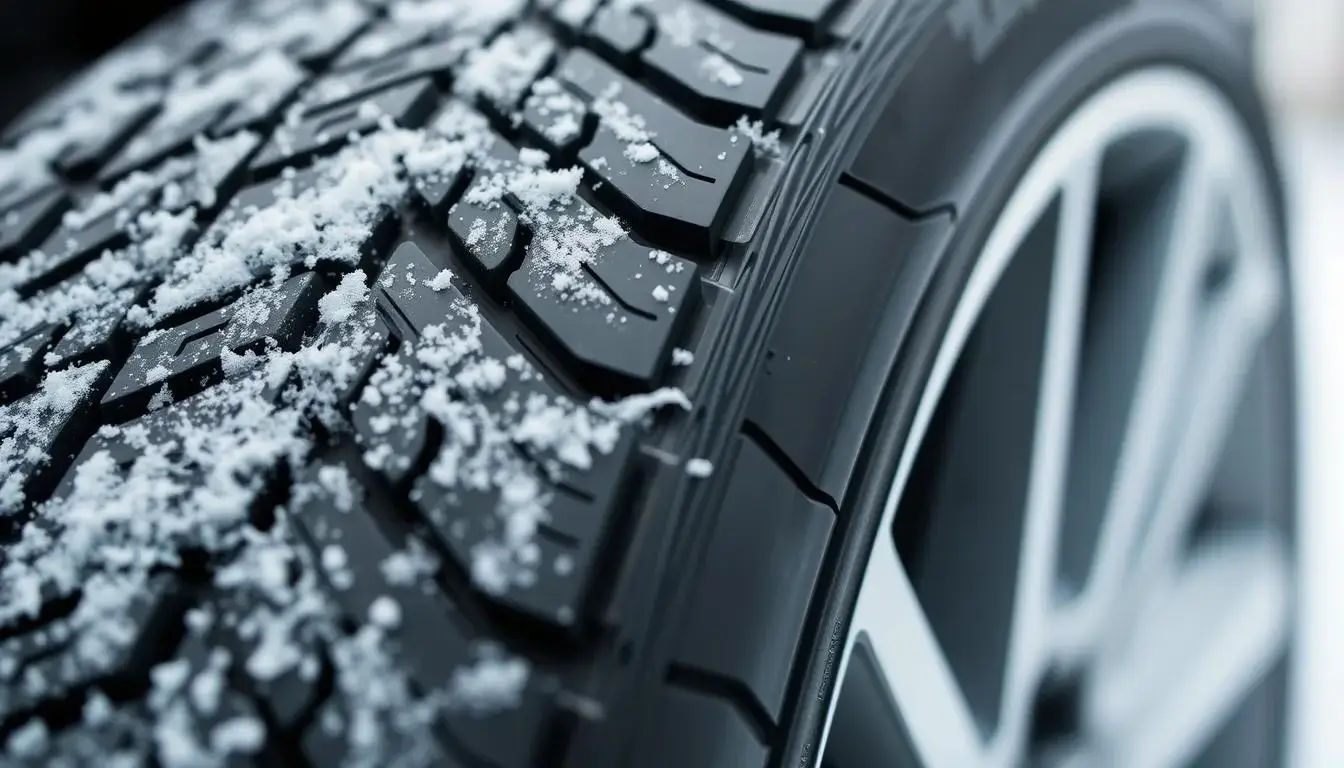Ever slid on a snowy road and wondered about your tire choice? The debate between winter and all-season tires is more than seasonal. It’s about safety and performance. As temperatures fall and roads get slippery, your tires are key to staying safe.
Knowing the difference between all-season and winter tires is vital for safe driving. All-season tires are good for any weather, but winter tires are best in the cold. But how do you pick the right one for you? Comparing winter tires vs. all-season tires can help you make the right choice.
Cold weather can lower tire pressure by 1 PSI for every 10°F drop. This affects how well your tires perform and stay safe. Also, tires with at least 4/32 inches of tread depth help stop better on wet roads. This is important when deciding between snow and all-season tires.
Exploring tire technology and performance reveals why choosing between all-season and winter tires matters. It’s not just about convenience. It’s about meeting your driving needs and local climate. Let’s look at the details to help you make a smart choice for your vehicle and safety.
Key Takeaways
- Winter tires excel in cold temperatures and snowy conditions
- All-season tires offer year-round performance in mild climates
- Tire pressure and tread depth significantly impact safety
- Climate and driving habits should guide your tire choice
- Proper tire selection enhances vehicle performance and safety
Understanding Tire Basics and Seasonal Performance
Choosing the right tire is key. It depends on how tires perform in different seasons. Let’s explore the basics of tire construction, how temperature affects them, and tread patterns. This will help you make a smart choice.
Tire Construction and Materials
Modern tires are amazing. They mix rubber, steel belts, and synthetic fibers. This mix helps them grip the road, support your vehicle, and handle various weather.
Winter tires have special rubber that stays soft in cold. All-season tires aim for good performance all year.
Temperature Impact on Tire Performance
Temperature is vital for tire performance. When it gets cold, regular tires get hard and lose grip. But, winter tires stay flexible and grip well on snow and ice.
All-season tires do well in mild weather but struggle in extreme cold or heat.
Tread Patterns and Their Purpose
Tread patterns do more than look good. They help push water, slush, and snow away. Winter tires have deep treads for better snow traction. All-season tires have a balanced design for all-year use.
| Tire Type | Tread Pattern | Best Performance |
|---|---|---|
| Winter | Deep, aggressive | Snow and ice |
| All-Season | Balanced | Mild conditions |
| Summer | Minimal | Dry, warm roads |
Knowing these basics helps you pick the right tire. Whether you face harsh winters or enjoy mild weather, the right tire is key for safety and a better driving experience.
Winter Tires vs All-Season: Key Differences
Understanding the differences between all season and winter tires is key. All-season tires work well in mild winter conditions. They don’t have the special tread compounds or siping for icy or deep snow. Winter tires, on the other hand, are made for extreme cold. They have deep tread and flexible rubber for better grip.
Are winter tires better than all season in harsh winter climates? Yes, they are. Winter tires improve braking on wet surfaces, thanks to their deep tread and flexible rubber. This is important because underinflated tires can hydroplane, which is dangerous.
All weather tires versus all season tires offer another choice. All-weather tires with a 3PMSF rating perform better in snow than standard all-season tires. They’re a good option for drivers facing mixed conditions, providing better grip without needing to change tires seasonally.
| Tire Type | Best For | Winter Performance |
|---|---|---|
| All-Season | Mild Winters | Limited |
| All-Weather | Mixed Conditions | Good |
| Winter | Extreme Cold | Excellent |
Why are winter tires better than all season in cold climates? Winter tires have deep grooves and silica-rich compounds for better wet-weather performance. This design keeps them flexible and grippy, even in cold temperatures. All-season tires can harden in extreme cold, reducing their traction.
The Science Behind Winter Tire Technology
Winter tires are a marvel of engineering, designed to tackle the toughest cold-weather conditions. Let’s explore the cutting-edge technology that makes winter tires outperform regular tires in icy and snowy environments.
Rubber Compounds and Cold Weather
The secret to winter tire performance lies in their unique rubber compounds. These special formulations stay flexible when temperatures drop below 46°F (7°C), unlike all-season tires that stiffen up. This flexibility allows winter tires to grip the road better, improving traction and reducing stopping distances by up to 25% compared to all-season tires on icy surfaces.
Siping Technology and Snow Traction
Winter tire tread vs all-season designs feature advanced siping technology. These tiny slits in the tread blocks act like mini-snow plows, biting into snow and ice for superior grip. The Nokian Hakkapeliitta R5, for example, uses Arctic Grip Crystals to enhance ice performance, while the Continental VikingContact 7 employs a variable tension control system for improved traction and braking.
Winter Tire Testing Standards
Rigorous testing ensures winter tires meet strict performance criteria. The 3PMSF (Three-Peak Mountain Snowflake) certification is a key indicator of a tire’s capability in severe winter conditions. For instance, the Michelin X-Ice Snow boasts this certification, proving its effectiveness in harsh winter weather.
| Tire Type | Ice Performance | Snow Traction | Wet Braking |
|---|---|---|---|
| Winter Tires | Excellent | Superior | Good |
| All-Season Tires | Poor | Fair | Very Good |
| All-Weather Tires | Good | Good | Good |
When comparing winter tires vs regular tires or winter vs all weather options, remember that winter tires excel in cold, snowy, and icy conditions. They provide unmatched safety and performance when temperatures plummet, making them a smart choice for drivers facing harsh winter climates.
All-Season Tires: Versatility and Limitations
All-season tires are great for many weather conditions. They work well on dry roads, in the rain, and even light snow. They’re a favorite for drivers in mild climates. But, they have their good and bad sides.
Temperature Range Performance
All-season tires do well when it’s above 45°F (7°C). They’re okay in mild winter weather but not on icy or snowy roads. For really cold weather, winter tires are better.
Tread Life and Durability
All-season tires last a long time. They’re used all year, which makes them last longer than special tires. This is good for drivers in places with mild winters.
Cost-Benefit Analysis
All-season tires are cheaper to buy but don’t do well in extreme weather. If you live in a cold area, winter tires might be safer. But, if you only get snow sometimes, all-season tires are a good choice.
| Tire Type | Cost | Performance in Snow | Year-round Use |
|---|---|---|---|
| All-Season | Lower | Moderate | Yes |
| Winter | Higher | Excellent | No |
Think about your local weather and driving habits when picking tires. The best SUV all weather tires are good for many conditions. But, even the best all-season tires have limits in very cold weather.
Safety Considerations and Stopping Distances
Winter driving demands your utmost safety focus. The decision between winter tires and all-season tires greatly affects your car’s performance. This includes how well it stops, which is critical in snowy conditions.
A study by Consumer Reports showed winter tires beat all-season tires by 35% on icy roads. This is a huge difference that could save lives in emergencies. Michelin’s research also found winter tires cut stopping distances by 25% compared to all-season tires. This is a big difference when every second counts.
Do all-season tires match the performance of snow tires? The answer is no. Cars with all-wheel drive and winter tires stop 25% faster than those with all-wheel drive alone. This gap grows wider in harsh winter weather.
| Tire Type | Stopping Distance Improvement | Performance on Ice |
|---|---|---|
| Winter Tires | 25% shorter | 35% better |
| All-Season Tires | Baseline | Baseline |
But safety isn’t just about tires. The National Highway Traffic Safety Administration says over 150,000 car accidents happen each year on icy roads. To stay safe, slow down and keep a safe distance from other cars. Choosing the right tires and driving safely can greatly reduce your risk on winter roads.
🚗 Need New Tires? Get Them Delivered & Installed Easily!
Now that you know the key differences between winter tires vs. all-season tires, it’s time to choose the best option for your driving conditions. Amazon offers top-rated tires at great prices, plus the convenience of professional installation services near you.
✅ Compare top brands, find the right size, and schedule installation—all in one place!
🔗 Shop Winter & All-Season Tires + Installation on Amazon
Climate-Based Tire Selection Guide
Choosing the right tires for your vehicle depends on your local climate and driving habits. Should you get winter tires or all season? Let’s explore this question and guide you through the decision-making process.
Regional Weather Patterns
Your location plays a big role in picking the best tires for your car. In areas with mild winters, all-season tires might be enough. The Michelin CrossClimate2, rated 4.9 out of 5 as the best all-season tire, works well in many conditions. It’s available in sizes from 16″ to 20″ and even has a three-peak mountain snowflake rating for light snow duty.
Urban vs. Rural Driving Needs
City dwellers often benefit from well-maintained roads, making all-season tires a practical choice. The Continental TrueContact Tour 54, scoring 4.8 out of 5, is an excellent option for urban drivers. Rural areas with less frequent plowing might require more specialized tires. For snowy conditions, the Michelin X-ICE SNOW, rated 4.9 out of 5 as the best winter tire, offers superior traction.
Legal Requirements by Region
Some regions mandate winter tires during certain months. It’s essential to check local laws before deciding between winter tires or all-season options. Remember, while all-season tires like the Yokohama AVID Ascend GT (rated 4.5 out of 5) perform well in many conditions, they may not meet legal requirements in areas with harsh winters.
Understanding your specific needs helps determine the best all-season tires for snow and ice or if dedicated winter tires are necessary. Consider factors like average temperatures, snowfall, and your driving patterns to make an informed decision.
Maintenance and Seasonal Changeover
Keeping your tires in good shape and changing them on time is key for safety and performance. Let’s look at how to manage your winter and all-season tires well.
Storage Requirements
When storing your off-season tires, keep them in a cool, dry spot. Make sure they’re clean and store them in airtight bags to stop rubber from breaking down. Store them flat or hang them up to keep their shape.
Timing of Seasonal Changes
It’s important to know when to switch to all-season tires. You should change them when the temperature stays above 7°C (45°F). This usually happens in spring, but weather can change by area. Winter tires shouldn’t be used all year because they wear out faster in warm weather.
Professional Installation Tips
While you can drive on winter tires in warmer months, it’s not advised. For the best results, have a pro install and balance your tires during the switch. They’ll make sure everything is set right for even wear and good handling.
Winter tires stay flexible below 7°C, unlike all-season tires. So, “Can you drive winter tires all season?” The answer is no. Driving on them in warm weather can cause them to wear out faster and perform poorly. Always choose safety and follow the maker’s advice for when to change your tires.
❄️ Ready to Upgrade Your Tires? Buy with Installation Today!
Whether you need winter tires for snow and ice or all-season tires for year-round driving, Amazon makes the process hassle-free. With a wide selection of trusted brands like Michelin, Bridgestone, and Goodyear, plus easy installation services available in your area, you can drive safely this season.
🚙 Don’t wait until winter hits—order your tires today and have them installed by a professional!
🔗 Find the Best Tires & Get Them Installed on Amazon
Conclusion
Choosing between winter tires and all-season tires is a big decision. It affects your safety and how well you drive. Winter tires are made for cold weather, while all-season tires work in many climates.
To know if your tires are for winter or all seasons, check for the Three-Peak Mountain Snowflake (3PMSF) symbol. Winter tires have this. All-season tires don’t but have deeper treads for different weather. Remember, winter tires can’t stay on all year because they wear out fast in warm weather.
Think about your local weather, how you drive, and your car’s type when choosing. In places like Chicago, where snow causes many accidents, winter tires are a must. For milder areas, all-season tires like the Fullway HP108 or Venom Power Terra Hunter X/T are a good choice. They balance performance and lasting well.
Always put safety first when picking tires. Whether you choose winter tires for their grip or all-season tires for their convenience, keep them in good shape. Regular checks and timely changes are important for the best driving experience.
❄️ Still not sure if winter tires are worth it? Find out how they enhance traction, braking, and control on snowy roads, and discover the best options for your vehicle:
🔗 Do Winter Tires Make a Difference? How to Choose the Best Ones?
FAQ
Can I use winter tires all year round?
No, winter tires are designed for extreme winter conditions, but they are a compromise when used in warm weather. Tires also wear out faster and lose efficiency on dry roads. If you need year-round performance, consider all-season tires, which are designed to offer a balance between summer and winter tires.
When should I switch from all-season to winter tires?
The best time to put winter tires on your vehicle is when temperatures drop below 45°F (7°C), typically in late fall or early winter months. Winter or snow tires provide better traction in the snow and perform well on snow and slush, even before snowfall begins.
Are all-season tires good enough for mild winter conditions?
All-season tires are designed for moderate climates and can handle light snow and slush, but they are a compromise in extreme winter conditions. If you experience heavy snow and ice, it’s better to invest in a set of winter tires for the season.
How do winter tires compare to all-season tires in stopping distance on snow?
Winter tires are designed to stop up to 30-40% faster on snowy roads compared to all-season tires. This can significantly improve safety in winter driving conditions, as tires will still have enough grip to prevent skidding.
How long do winter tires last?
A set of winter tires typically lasts 3-4 seasons or 30,000 to 40,000 miles, depending on road conditions, driving style, and proper maintenance. Always inspect tread depth before putting snow tires on your vehicle for another season.
Are studded winter tires better than regular winter tires?
Studded winter tires provide extra grip on ice and snow, making them ideal for extreme winter conditions. However, they may not be necessary for all drivers and can be banned in some areas due to road wear. Winter tires also use advanced tread designs and rubber compounds to achieve great traction without studs.
How should I store my off-season tires?
When switching from summer to winter tires, store your off-season tires in a cool, dry place away from direct sunlight. If possible, use tire bags to protect them. Proper storage can extend the lifespan of both your winter and summer tires.
Can I mix winter tires with all-season tires on my vehicle?
No, mixing all-season tires and winter tires is not recommended. It can cause uneven handling and reduce stability in winter driving conditions. Always use a full set of winter tires for optimal performance and safety.
Do I need winter tires if I have an all-wheel drive vehicle?
Yes! All-wheel drive improves acceleration, but it does not help with braking or cornering on snow and slush. Winter tires are far superior when it comes to traction and stopping power in winter months.
What’s the difference between all-season, all-weather, and winter tires?
To understand the difference between all-season, all-weather, and winter tires, here’s a quick breakdown:
✅ All-season tires: Work well in mild climates, but struggle in extreme winter conditions
✅ All-weather tires: A middle-ground option with better traction in the snow, suitable for year-round use
✅ Winter tires: Specifically designed for extreme winter driving, offering superior performance on snow and ice
Should I buy winter tires or keep using all-season tires?
If you live in an area with heavy snow and ice, buying winter tires is the safest choice. If winters are mild, all-season tires might be enough. For drivers in between, all-weather tires can provide a practical alternative.



